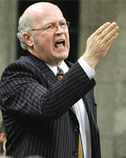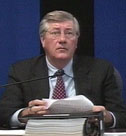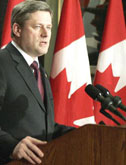Now we know .. the new government in Ottawa will be a Conservative-Bloc Quebecois alliance after all
Feb 21st, 2006 | By Counterweights Editors | Category: Ottawa Scene
BQ's Michel Gauthier
No doubt the strange vibrations coming out of Ottawa over the past two weeks could not have gone on too much longer. They were almost starting to eat away at what section 91 of the Constitution Act 1867 prescribes as “the Peace, Order, and good Government of Canada.”
The trouble started on February 6, when the new Conservatives rushed in with the message that they were going to govern as if they had a majority in Parliament. In fact they had and have a mere slender plurality of seats, won with the second-lowest percentage of the popular vote (36.3%) of any government in the 139-year history of the Canadian confederation.
But, the story went, each of the opposition parties had its own reasons for not wanting another federal election any time soon. When push came to shove, they would all be happy to keep Stephen Harper in office for quite a while yet. And this first rushing-in, accompanied by some popular revolt (or at least revulsion?) over a few neo-Machiavellian Harper cabinet appointments, finally prompted both the Liberals and then the New Democrats to add their own contrary strange vibrations.
They each in their own way put it out that they were ready to force a fresh election as early as was necessary, to keep the new Conservative minority government in line with what the democratic electorate actually voted for on January 23. At least for the most anxious followers of Canadian federal politics, it remained unsettlingly unclear just what kind of government in Ottawa the early 2006 election had called into being.
Now, thanks to the youthful energy of the still somewhat teenage-looking Bill Curry at the Globe and Mail, the answer to all the questions has been revealed at last. And for the time being the strange vibrations have suddenly subsided.
Michel Gauthier, House leader of the Bloc Quebecois, has told Mr. Curry that his party “intends to keep the Conservative minority government in office for a good while,’ encouraged by the Tories’ openness toward Quebec.” The original theory that a Harper Conservative government was only really possible in some kind of effective alliance with the sovereigntist Bloc Quebecois turns out to be right after all. And who knows? It could be the start of a beautiful friendship. Or better, or worse. The next few years will in any case continue to be quite interesting, from various points of view.
Not such an “Unholy Alliance”?

Former Ontario premier Mike Harris (a neo-con Tory also friendly to Quebec sovereigntists)
As Bill Curry has explained, the BQ’s announced intention to prop up the new Harper government does inject some kind of fresh and at least in principle workable logic into the coming shape of Canadian federal politics: “With the Liberals already digging in their heels more than a month before the new Parliament begins and the NDP at least one vote shy of holding the balance of power, the Bloc will often be the deciding factor between Conservative success and an early federal election.”
On the assumption of some effective Conservative-Bloc Quebecois alliance of this sort, the basic parliamentary numbers now look reasonable enough as well, in various directions. A bare majority in the current 308-seat Parliament, e.g., is 155 seats. Together the Conservatives (125 seats after the Emerson defection) and the Bloc Quebecois (51 seats) can command a quite solid majority of 176 seats.
Even all together the Liberals (102 seats), the New Democrats (29 seats), and the one Independent from Quebec can muster only 132 seats. Moreover, even if you choose to dwell merely rhetorically on the January 23 popular vote, the effective Conservative-Bloc Quebecois alliance does not look all that bad. Taken together the Liberals (30.2%) and the New Democrats (17.5%) still have a slightly larger 47.7% of the popular vote. But the Conservatives (36.3%) and Bloc Quebecois (10.5%) together come very close to this at 46.8%.
Bill Curry’s report goes on with some further remarks worth underlining: “Many federal Liberals warned during the last election that a Conservative minority beholden to the Bloc would lead to the dismantling of federal powers and a rise in Quebec sovereignty … But Bloc House Leader Michel Gauthier dismisses those warnings … In an interview, he said his party has no intention of imposing such demands and will simply be happy with an end to Liberal centralization and the Conservative pledge to respect the constitutional division of powers.”
Mr. Curry further goes on to quote M. Gauthier: “We don’t want useless battles. We want to help the government function for a while. I have no shame in saying I will be urging my colleagues . . . to conduct ourselves in a way that the government stays in place for a good while to do what needs to be done … [The Conservatives] have already shown more openness than the Liberals. The Liberals were centralist in everything they did, trying to infringe on the responsibilities of Quebec. It couldn’t be worse than that. I think the Conservatives will be more respectful of Quebec’s responsibilities.”
And then Mr. Curry adds: “Mr. Gauthier said the Bloc will not spearhead specific policies, but will push to ensure government policies are good for Quebec … You can’t be too dogmatic. You can’t head into the session saying you want to transfer all responsibilities to Quebec. It’s not that at all,’ he said.”
And now the first New Tory Supreme Court Appointment … Harper starts to make sense, sort of?

Mr. Harper in office : showing some true colours at last?
On the same day that M. Gauthier’s revelations to Mr. Curry were revealed to the great Canadian multitude, Prime Minister Stephen Harper announced that this Thursday, February 23 he will name a nominee to fill the current vacancy on the Supreme Court of Canada. Then, in at least the very mild beginnings of a more “accountable” departure from past Canadian practice, “a special Commons committee will hold three hours of televised hearings” on the nomination, on the subsequent Monday, February 27.
The nominated judge will appear at these hearings, and answer questions from the MPs. His or her name will “come from a short list of three names prepared for the Liberal government just before the election campaign which brought Harper to power.” The “political parties in the Commons will have until Wednesday to name MPs to the new committee. Harper said the committee will reflect the makeup of the Commons so that no party will have a majority.” The nominated judge “will make a formal statement to the MPs before questions begin.” And, according to TV reports, noted constitutional lawyer Peter Hogg will somehow be advising the MPs on just what kinds of questions they might reasonably ask.
Whatever the questions are (or the answers), the MPs won’t actually have any kind of veto over the ultimate appointment of the new judge – as the Senate does over Supreme Court appointments in the USA. As the Canadian Press report on the subject explains: “Constitutionally, the prime minister has the last word on selecting justices for the high court and that won’t change. But Harper said he will take the committee’s deliberations into account in making his final decision, which is to be announced March 1.”
This is the bare minimum degree of movement towards more accountable prime ministerial Supreme Court appointments that Prime Minister Harper might have made, given his earlier commitments to some kind of reforming action on this front. It is already, however, shaking up the Canadian legal establishment somewhat. And it does seem vaguely in the direction of the kind of constructive political reform agenda that the new government might take on, in the interests of Canada at large. Set beside the news about some kind of effective new Conservative-Bloc Quebecois alliance in Parliament, it could even be read as at least some evidence that the new order in Ottawa is starting to make a little sense.
Which is no doubt how Mr. Harper, at any rate, would like things to be read. Now, just what is he really going to do about Senate reform … and when will that be happening? Or will we just be having elected Senators who can be televised sitting in the gallery of the Red Chamber, but will not actually vote or otherwise take part in the proceedings on the floor?
The new prime minister, it would seem from his first outing on Supreme Court appointments, is actually a quite cautious and even conservative person in an older Canadian sense. And he is not really all that eager to give up any of the friendly dictator prime minister’s now traditional powers, in the interests of a more perfect Canadian democracy. (And, besides, just how far is the Bloc Quebecois going to want to go with Senate reform anyway?)


[…] Meanwhile, various Ottawa wags have quipped that if both the Bloc and the New Democrats wind up supporting the government motion this Friday, Mr. Harper will be saved (?) by the same “coalition†of “separatists and socialists†that he “attacked Liberal leader Michael Ignatieff for seeking in a speech … earlier this month in Sault Ste. Marie, Ontario.†Even if only the Bloc does the trick this Friday, some very long-term counterweights readers may have a sense of deja vu all over again — as they recall the headline from our article of February 21, 2006: “Now we know .. the new government in Ottawa will be a Conservative-Bloc Québécois alliance after all.†[…]